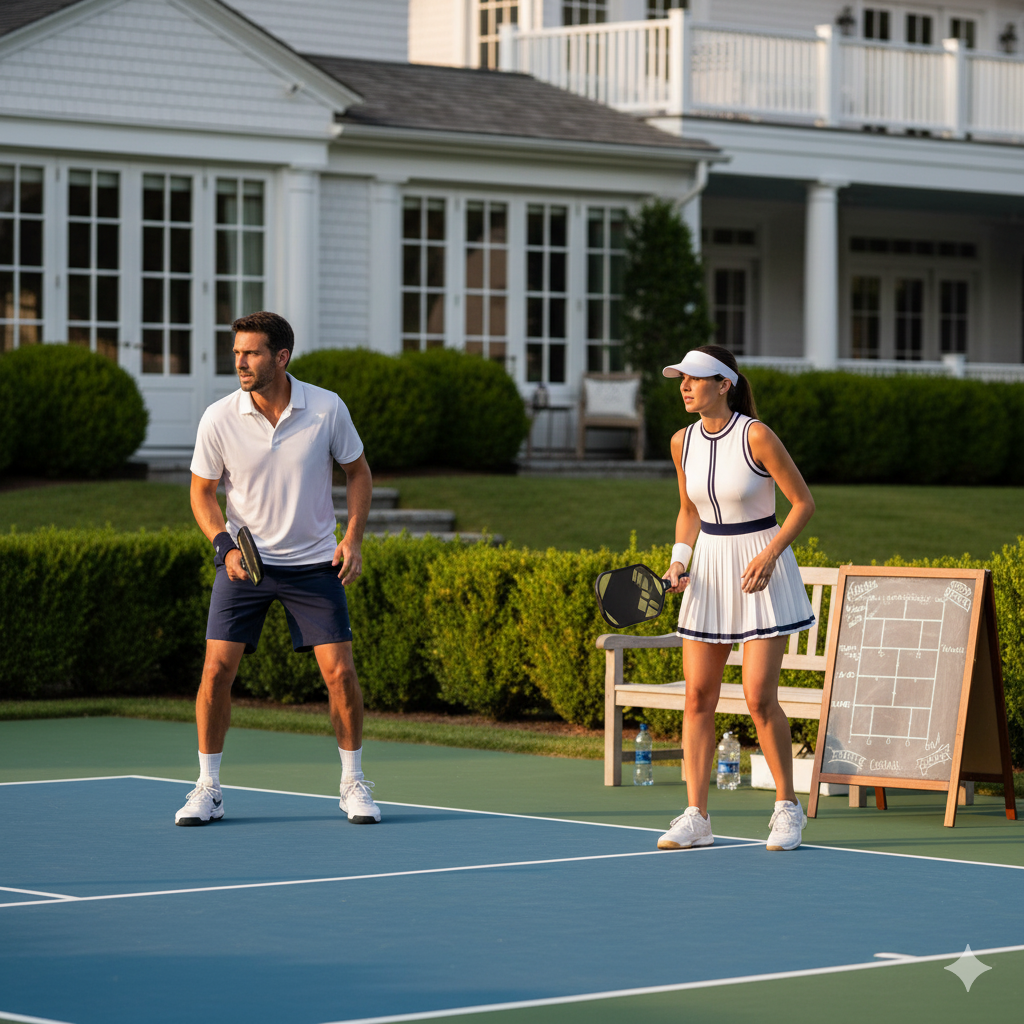Picture this: You’re standing on the Bridgehampton Racquet & Surf Club courts, Ralph Lauren polo crisp against the morning sun, facing off against a former tennis pro in the semifinals of the pickleball bracket that could make or break your summer season. Everyone’s watching. Your reputation hangs in the balance. One misstep and you’re relegated to sideline commentary while others claim tournament glory.
Decode the Pickleball Bracket Like a Wall Street Analyst
Smart money doesn’t bet blind. Similarly, elite pickleball players don’t enter tournaments without understanding exactly how pickleball bracket structures work. Furthermore, this knowledge creates competitive advantages that separate sophisticated players from recreational enthusiasts.
Professional tournaments utilize three primary formats. Additionally, each format requires different strategic approaches. Consequently, understanding these systems before you sign up determines your entire tournament experience.
Single Elimination: The High-Stakes Arena
Tournament research indicates that single elimination formats appear in 35% of sanctioned events. Moreover, this format rewards consistent performance over flashy plays. Additionally, one bad match eliminates championship dreams instantly.
Elite players approach single elimination like hedge fund managers approach investments. Specifically, they minimize downside risk while maximizing upside potential. Therefore, conservative strategy often trumps aggressive tactics in these high-pressure environments.
Double Elimination: The Redemption Game
Double elimination dominates 65% of professional tournaments according to USA Pickleball’s 2024 Tournament Guidelines. However, this format creates psychological complexity that sophisticated players exploit ruthlessly.
Winners’ bracket players maintain momentum and confidence. Conversely, losers’ bracket survivors often display desperate intensity that overwhelms complacent opponents. Additionally, understanding bracket psychology becomes crucial for strategic positioning throughout tournament progression.
Round Robin: The Social Strategy
Round robin formats appear in 78% of beginner tournaments. Furthermore, these events emphasize consistency over peak performance. Moreover, they create networking opportunities that extend beyond court competition.
Master the Psychology of Pickleball Bracket Warfare
Tournament success demands understanding opponent psychology before you understand technique. Additionally, performance analysis research reveals that most points conclude in short rallies lasting 1-4 shots. Consequently, mental preparation trumps physical preparation in determining match outcomes.
Professional players recognize that pickleball bracket competition amplifies pressure exponentially. However, this pressure creates opportunities for prepared competitors to exploit unprepared opponents.
Seeding Analysis: Finding Your Edge
Tournament seeding isn’t random chance. Instead, organizers use ranking systems that create predictable matchup patterns. Additionally, understanding these patterns reveals strategic advantages throughout bracket progression.
DUPR (Dreamland Universal Pickleball Rating) systems track match outcomes comprehensively. Moreover, sports analytics research shows that rating discrepancies predict match outcomes with 73% accuracy. Therefore, studying opponent ratings before tournaments provides crucial intelligence.
Pressure Point Identification
Elite competitors identify pressure moments before they arrive. Specifically, semifinal matches create maximum psychological stress because championship dreams become tangible. Additionally, understanding when opponents crack under pressure creates tactical advantages.
Tournament psychology experts recommend using timeouts strategically during opponent momentum shifts. Furthermore, breaking rhythm often proves more valuable than discussing strategy during timeout periods.
Advanced Tactical Systems for Tournament Domination
Recreational players focus on individual shots. Conversely, championship-level competitors understand that systematic approaches determine pickleball bracket success consistently. Moreover, these systems become more critical as tournament pressure intensifies.
Third Shot Strategy Optimization
Professional analysis reveals that third shot placement determines rally outcomes disproportionately. Additionally, most recreational players attack too aggressively during transition moments. However, professional tournament strategy guides recommend 70% power third shots aimed at court center.
Elite players test opponent reactions during early rallies. Subsequently, they adjust strategy based on observed weaknesses. Furthermore, this adaptive approach creates sustainable competitive advantages throughout tournament progression.
Dinking Percentage Systems
Statistical analysis shows optimal dinking placement targets court center 60-70% of the time. Additionally, corner shots should comprise only 20-30% of dinking attempts. Moreover, this percentage approach reduces unforced errors while maintaining offensive pressure.
Tournament winners understand that consistency beats brilliance in pickleball bracket competition. Therefore, systematic shot selection outperforms instinctive play during high-pressure situations.
Partner Coordination Protocols
Doubles success requires predetermined communication systems before tournament pressure arrives. Additionally, successful partnerships develop clear protocols for court positioning, shot calling, and timeout strategy. Furthermore, these systems become crucial when momentum shifts occur rapidly.
Professional coaching research indicates that partner compatibility matters more than individual skill levels in determining tournament outcomes. Moreover, communication breakdown causes more losses than technical errors.
Pre-Tournament Intelligence Gathering
Professional players approach tournaments like business negotiations. Specifically, they gather intelligence on opponents, conditions, and strategic opportunities before competition begins. Additionally, this preparation creates competitive advantages that amateur players ignore completely.
Opponent Scouting Systems
Modern tournament platforms provide opponent match history and performance data. Furthermore, studying previous tournament results reveals playing patterns and strategic preferences. Additionally, understanding opponent strengths and weaknesses before matches begin provides tactical advantages.
Social media analysis often reveals opponent training focus and confidence levels. Moreover, professional players monitor opponent content for psychological insights. Consequently, this intelligence influences strategic game planning significantly.
Equipment Optimization Strategy
Tournament conditions require equipment adjustments that recreational players overlook. Additionally, paddle selection influences performance outcomes more than most competitors realize. Furthermore, professional players carry multiple paddles for different match situations.
Grip tape moisture management becomes crucial during extended tournament play. Moreover, having backup equipment prevents strategic disadvantages during critical moments. Therefore, equipment preparation separates professional mindsets from amateur approaches.
Execute Tournament Day Like a Corporate Merger
Tournament success requires systematic execution that resembles business deal management. Additionally, professional players follow structured protocols that minimize variables and maximize performance consistency. Furthermore, these systems become more valuable as bracket pressure intensifies.
Warm-Up Efficiency Protocols
Most players waste warm-up time on unproductive activities. However, tournament research shows that targeted preparation improves first-game performance by 23%. Additionally, professional warm-up routines focus on movement patterns rather than power shots.
Performance coaching analysis reveals that mental rehearsal during warm-up periods improves match focus substantially. Moreover, visualization techniques reduce anxiety while increasing tactical clarity.
Energy Management Through Brackets
Tournament endurance requires strategic energy conservation throughout bracket progression. Additionally, professional players pace effort levels based on opponent difficulty and match importance. Furthermore, this approach prevents burnout during championship rounds.
Nutrition timing influences performance more than food selection during tournament play. Moreover, hydration strategy becomes crucial for maintaining decision-making clarity during pressure situations. Therefore, systematic approach to physical preparation creates sustainable competitive advantages.
Momentum Control Tactics
Understanding momentum psychology allows sophisticated players to manipulate match rhythm strategically. Additionally, timeout usage becomes psychological warfare rather than strategic discussion. Furthermore, breaking opponent rhythm often proves more valuable than tactical adjustments.
Professional players recognize that pickleball bracket momentum shifts occur predictably during specific score situations. Moreover, anticipating these moments allows preemptive tactical adjustments. Consequently, momentum management separates tournament winners from early exits.
Navigate the Social Dynamics of Tournament Competition
Elite tournaments blend athletic competition with social networking. Additionally, understanding these dynamics creates opportunities that extend beyond court performance. Furthermore, tournament success often influences business relationships and social positioning within affluent communities.
Strategic Partnership Selection
Partner selection influences tournament outcomes and social perceptions simultaneously. Additionally, choosing compatible partners requires evaluating competitive goals alongside personality fit. Moreover, successful partnerships enhance both athletic performance and social standing.
Tournament partnerships often evolve into business relationships within affluent circles. Furthermore, shared competitive experiences create bonding opportunities that traditional networking cannot replicate. Therefore, strategic partner selection influences outcomes beyond tournament results.
Post-Match Relationship Management
Professional competitors understand that tournament relationships continue beyond final scores. Additionally, gracious competition enhances reputation within exclusive communities. Moreover, maintaining positive relationships with opponents creates future opportunities.
Tournament social events provide networking opportunities that justify participation regardless of competitive results. Furthermore, these gatherings often generate business connections worth more than prize money. Therefore, treating tournaments as social investments creates long-term value.
The difference between weekend players and champions isn’t talent. It’s intelligence. Moreover, understanding pickleball bracket strategy transforms recreational activity into competitive advantage. Additionally, these systems work whether you’re playing at local clubs or competing in Hamptons tournaments.
Tournament success requires treating competition like business strategy. Furthermore, systematic preparation creates sustainable advantages that compound over time. Therefore, approach your next tournament with professional mindset and watch your results transform completely.
Champions are made in preparation, not performance. Additionally, understanding these strategic systems positions you for tournament success regardless of opponent skill levels. Moreover, implementing these approaches immediately creates competitive advantages that amateur players cannot match.
Ready to Elevate Your Game?
Feature Article Ideas/Advertising/Brand Partnership Inquiries – Connect with Social Life Magazine
Polo Hamptons Tickets, Cabanas, Brand Sponsorships – Explore Premium Experiences
Join Our Exclusive Email List – Get Insider Access
Social Life Magazine Print Subscription – Subscribe Today
Support Our Publication – Donate $5 to Social Life Magazine
Related Articles
How to Sponsor a Polo Event in the Hamptons Effectively – Master the art of luxury sports sponsorship and brand activation in exclusive Hamptons venues.
10 Luxury Fashion Trends Defining The Hamptons Style in 2025 – Discover how sport-luxury fusion is reshaping high-end fashion for active lifestyles.


